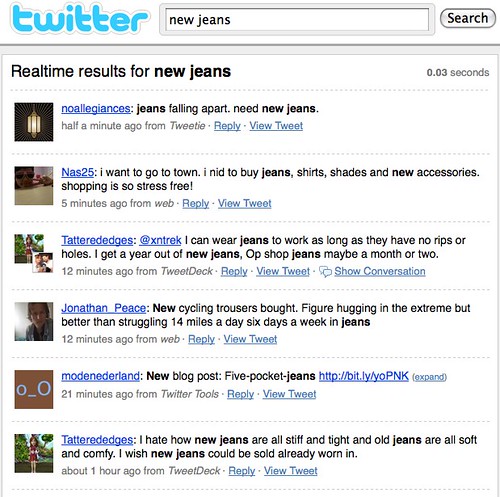![]() Twitter has transformed the way we communicate in the world. That’s a big deal, because as human beings, the ability to communicate is how we broke free from the rest of the animal kingdom. Our entire society is based on this fact, and so it should come as no surprise that so are some of our biggest industries. Advertising, the billion-dollar industry that funds the web and media, is literally about communicating to the public.
Twitter has transformed the way we communicate in the world. That’s a big deal, because as human beings, the ability to communicate is how we broke free from the rest of the animal kingdom. Our entire society is based on this fact, and so it should come as no surprise that so are some of our biggest industries. Advertising, the billion-dollar industry that funds the web and media, is literally about communicating to the public.
More fundamentally, that’s how the market economy operates. There are three elements to a market: conversations, relationships, and transactions. In the industrial age, we forgot about this and came to associate markets as purely transactional: we see a price attached to a mass produced item, and that is meant to convey everything we need to know. But as Doc Searls shares the story with his African friend, the conversation at the market is how selling used to be done, underpinned by a relationship.
My firm PricewaterhouseCoopers is one of the biggest firms in the world. In Australia, we are almost twice the size of our nearest competitor and manage to charge more than our competitors as well without consequence. I’ve often wondered how this could be, but it was only until I broke down the fundamental components of the market that I realised. Price matters – but only when you don’t know anything else. When someone gets to know someone at the firm, they have conversations – and build a relationship. Those relationships are what makes PwC the behemoth it is. It’s not that price is irrelevant, but now with additional information to inform an economic buyer, it’s no longer the sole determinant.
Demand and Supply, sitting in a tree
Twitter co-founder Isaac “Biz” Stone recently defended the company’s stance on advertising as a revenue model. He rightly says the banner ad model is dead – no kidding. But his brilliance comes through when he says that they are exploring ways in “facilitating connections between businesses and individuals in meaningful and relevant ways”. Those words so simply explain more than just Twitter’s opportunity, but the entire future of advertising.
My half-cousin Alex Lambousis has created his own fashion label. Primarily a Jeans business, he controls the entire design process as he owns an industrial laundry, and so can compete on the global scale with high-end jean product. Like any startup, he’s trying to crack new markets.
Think about Alex’s issue. He’s a wholesaler, who relies on retail outlets to sell his product – not exactly the best of customers. He’s reliant on celebrities wearing his clothes, and negotiating special rack space in high end fashion outlets, to get exposure of his world-class product. But it’s a hard market to crack – he’s had success, but is not where he wants to be. What’s a man to do?
Have a look at this search query I just did on Twitter’s community. Twitter allows you – in real time – to search for what people are talking about right now. My first attempt, without trying to be creative with the search string, yielded the following results:

A new customer just appeared on the market half a minute ago. A few of the others can be identified as market opportunities. Imagine if Alex simply responded to them, giving them a discount on his range or just pointing them to a blog post where he can show case his in-depth knowledge. Before the Internet, for a wholesaler like Alex to make money, he relied on advertising in fashion magazines. Now he can interact directly with his customers, and even if he can’t make a sale – he can at least invest in a relationship for future sales.
He’s having a conversation and building relationships. Price is no longer the only source of information for the customer. Those curves on the demand and supply curve have now been personified. That’s better than some poster stuck on a billboard – that’s a return to how our world used to work before factory’s pumped our standard-issue Model T’s.
I might not have solved Twitter’s revenue challenge in this post, but I sure as hell am excited about the future opportunities afforded by tools like Twitter for the economy.
